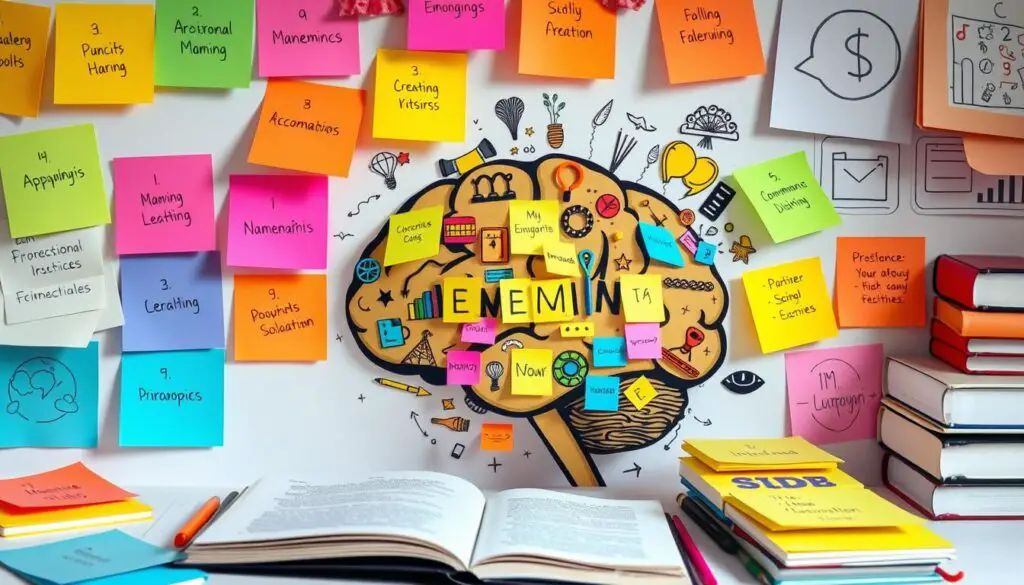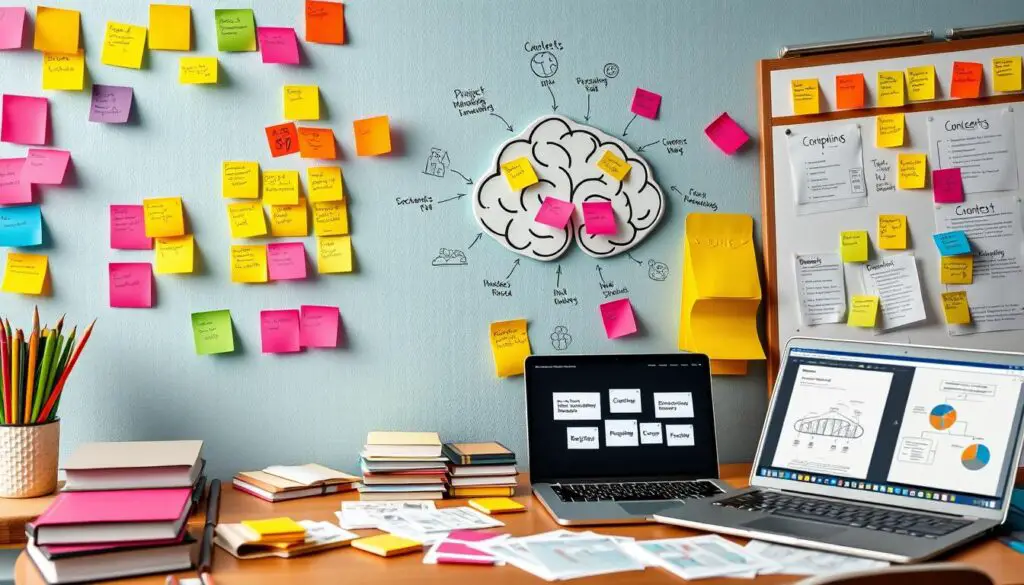Preparing for the PMP exam requires effective learning methods. Mnemonic techniques are a great way to boost your PMP Study Plan. They help you remember information better and recall it quickly during the exam. This makes understanding complex project management concepts easier.
By using these memory strategies, you can pass this challenging test. The test has 200 multiple-choice questions to be answered in four hours. You need to score at least 61% to pass.
In this guide, you’ll learn five effective mnemonic techniques for your exam prep. The PMP credential is globally recognized. It not only increases your knowledge but also your career opportunities and earning power in project management.
Whether it’s using acronyms or creating visual aids, these strategies make studying more fun and productive. Let’s explore how to use them to increase your success chances!
Understanding the Importance of Mnemonic Techniques in PMP Exam Prep
Mnemonics are key in PMP exam prep. They help you remember things better by making connections and creating images in your mind. With the PMP exam covering many areas, mnemonics make complex info easy to understand. They make studying fun and effective.
Enhancing Memory Retention
Good memory is essential for learning project management. Mnemonics, like acronyms or images, boost your memory. They help you remember important concepts and steps, like the five process groups.
This knowledge prepares you well for the PMP exam.
Facilitating Quick Recall During the Exam
Mnemonics help you recall info fast during the exam. You have 230 minutes to answer 180 questions, so speed is important. Mnemonics make complex info easy to remember.
They make studying fun and reduce anxiety. This helps you do well in the PMP exam.
Five Effective Mnemonic Techniques for Your PMP Study Plan
Adding mnemonic techniques to your study plan can really help. They make complex project management ideas easier to understand and remember. Here are five methods that can make your PMP exam prep more effective.
Acronyms and Abbreviations
Acronyms simplify complex terms, making them easier to remember. For example, IPEMCC stands for Initiating, Planning, Executing, Monitoring & Controlling, and Closing. Studies show acronyms can speed up recall by 20% compared to just memorizing.
Using abbreviations with main concepts helps organize your thoughts. It ensures you remember important details during the exam.
Visualization Techniques
Tools like flowcharts and graphs are great for visual learning. They can boost understanding and retention by 30% for project management students. Creating mental images for concepts makes them easier to grasp and remember.
Try drawing diagrams that link different PMP exam knowledge areas. The method of loci can improve recall by about 50% with regular practice.
Rhymes and Songs for Retention
Turning complex info into catchy tunes can really help memorize it. Songs can make information stick for up to 65% longer than just memorizing it. Making rhymes or songs for key project management ideas is a fun way to learn.
About 60% of PMP exam prep students use musical mnemonics. This method can also lower study stress.

| Mnemonic Technique | Key Benefits | Effectiveness |
|---|---|---|
| Acronyms | Improves recall speed | 20% faster compared to traditional methods |
| Visualization | Enhances comprehension | 30% better retention |
| Rhymes/Songs | Increases memorization duration | Retain info 65% longer than rote learning |
| Storytelling | Contextual learning | Boosts retention by over 20% |
| Regular Practice | Long-term retention improvement | 10% to 30% enhancement |
Try out different mnemonic methods to see what works best for you. Using these techniques can greatly improve your ability to learn and remember important information for your PMP exam.
5 Ways to Incorporate Mnemonic Techniques into Your PMP Study Plan: A Guide
Getting ready for the PMP exam needs smart ways to remember lots of project management ideas. Using mnemonics can really help you remember and understand better. Here’s how to add these techniques to your study plan.
Choosing the Right Technique for You
Finding the right mnemonic method depends on how you learn best. Some people do well with acronyms or pictures, while others like rhymes or breaking down info. Find out what works for you to improve your understanding and memory for the exam.
Adapting Techniques for Different PMP Topics
Different PMP topics need different mnemonic strategies. For example, risk management might use pictures, and earned value formulas might use acronyms. Make your mnemonic tools fit the tough topics for you. This way, you’ll get better at hard subjects and remember more during the exam.
Regular Practice and Implementation
Sticking to mnemonic techniques is key. Make different mnemonic tools for each area and check them often. Regular use helps you remember better over time. Also, keep track of how well your mnemonics work and change them if needed to match your learning.

| Mnemonic Technique | Recommended Use | Benefits |
|---|---|---|
| Acronyms | For key terms and processes | Easy to remember and quick recall |
| Visualization | Complex concepts and relationships | Enhances understanding and retention |
| Rhymes/Songs | To memorize lists or sequences | Engaging and fun, aids long-term memory |
| Chunking | Breaking down dense material | Reduces cognitive load for easier processing |
| Mind Mapping | Linking ideas and concepts | Promotes deeper understanding through connections |
Using these strategies for PMP study helps you prepare well for the exam. Customize your methods to fit your learning style for the best results. This will help you on your path to getting certified.
Creating Your Own Mnemonics for Better Engagement
Making your own mnemonics can really boost your studying. It lets you use your creativity to make study methods that fit you. This way, you not only remember stuff better but also enjoy learning, making study time a chance to grow.
Steps to Craft Personalized Mnemonics
To make mnemonics that are just right for you, follow these steps:
- Identify Key Information: Pick out the main ideas or terms you want to remember.
- Use Familiar Associations: Connect new info to things you already know or find interesting.
- Simplify and Innovate: Make up acronyms, rhymes, or pictures that make the info easy to grasp and fun.
- Test Your Mnemonics: Check how well they work by trying to recall the info.
Involving Study Groups for Diverse Ideas
Working with study groups can bring in fresh ideas and make your mnemonics better. When you study with others, you get a chance to share and learn from each other. Here’s how to get your group involved:
- Brainstorm Together: Share your mnemonics and get feedback to make them even better.
- Introduce Gamification: Make it a game where everyone shares their mnemonics and competes to see who’s the most creative.
- Focus on Themes: Pick a topic for each session and work together to create mnemonics, highlighting teamwork.

Common Mistakes to Avoid When Using Mnemonics
Mnemonic techniques can greatly improve your effective memorization skills. But, common mistakes can lessen their effectiveness. It’s important to avoid making mnemonics too complicated. They should be simple and easy to remember.
Finding the right balance between creativity and simplicity is key. This balance helps you reach your study goals more effectively.
Overcomplicating Mnemonic Aids
Trying to make mnemonic devices too complex can confuse you. Such complexity can make them less effective. Instead, focus on avoiding complexities that make recall hard during exams.
For the best results, use clear and short phrases or images. These should directly relate to what you’re studying.
Neglecting Context and Relevance
Context is essential for mnemonic success. Ignoring relevance can make your aids less effective. Make sure your mnemonics match the project management concepts you’re studying.
Connecting your mnemonics to the material strengthens your memory. This helps you understand complex subjects better. It also improves your performance on the PMP exam.
Tips for Practicing and Solidifying Mnemonic Techniques
Adding mnemonic techniques to your daily routine can really boost your studying. This is very helpful when you’re getting ready for the PMP certification. Making these methods a regular part of your study routine helps you learn and remember important project management skills.
Incorporating Mnemonics into Daily Study Habits
To get the most out of your study time, mix mnemonic techniques into your daily life. Here are some tips:
- Make a special time each day to work on your mnemonics.
- Use visual tools like mind maps to help you remember complex topics.
- Link mnemonics with active recall to make learning stick through repetition.
Testing Yourself with Mock Exams
Mock exams for PMP are a great way to check how well your mnemonic techniques work. These tests help you see how well you remember information and where you might need to improve. Here are some tips for making the most of mock exams:
- Take mock exams regularly to track your progress and understanding.
- Look at your results to see which mnemonics helped you remember certain things.
- Work on any techniques that didn’t help you much during the tests to improve your memory.

By using these strategies regularly, you’ll improve your memory and be ready for the PMP exam. Daily study habits and self-testing are key to success in getting your PMP certification.
Conclusion
Mnemonic techniques are key tools in your PMP study plan. They make complex information easier to handle. By using mnemonic aids, you can better remember PMP concepts.
Techniques like acronyms, visualization, and personalized mnemonics fit your learning style. This makes studying more effective. These strategies help you remember information better.
Using mnemonic strategies in your study routine boosts memory and confidence. It also quickens your recall during the test. The PMP exam has 200 questions across five domains. Good preparation is essential.
Stay committed and flexible with your mnemonic methods. The more you engage with these tools, the closer you’ll get to passing the PMP exam. This will help you succeed in project management.
Source Links
- How to use mnemonic techniques for PMP certification exam – Security Courses
- Mnemonic for 10 Project Management Knowledge Areas | PM DRILL
- How Mnemonics Help You Study
- Understanding PMP Knowledge Areas for the PMP Exam
- Master the PMP Exam Online: A Comprehensive Guide for Success
- How to use mnemonic techniques for remembering PMP processes and formulas – PMP Classes
- What, Me Worried? Five Tips to Improve Study and Comprehension for Passing Business Analysis Certification Exams | Business Analysis, PM, and Agile Training and Consulting | Watermark Learning Blog
- 10 Knowledge Areas for Project Management Professionals (PMP)
- Best PMP Certification Training
- What’s New in PMBOK 6th Edition
- CompTIA Advanced Security Practitioner (CASP+) CAS-004: Detailed Study Plan – ExamSnap
- Project Management on LinkedIn: Master the Art of Learning. How to Remember and Retain Knowledge: A… | 33 comments
- PMP Formulas: A Comprehensive Cheat Sheet for Project Managers
- How to Prepare for the PMP Exam: The Top Resources for PMP Study
- PMP ITTO (Inputs, Tools, Techniques & Outputs): A Complete Guide
- 10 Essential Tips for Passing the PMP Certification Exam
- PMP Exam: How To Pass the PMP Exam? Full Guide With Exam Questions!




